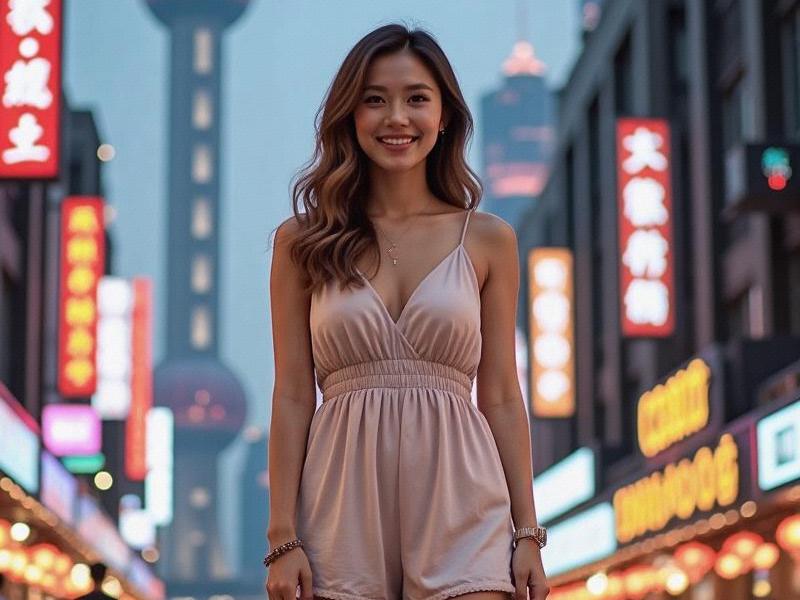This feature explores how Shanghai women are creating a distinctive urban aesthetic that blends traditional Chinese elements with global influences, while challenging conventional beauty norms.

The morning light filters through the plane trees along Huaihai Road as twenty-something designer Zhang Wei adjusts the cheongsam-inspired dress on her mannequin. This scene in Shanghai's former French Concession encapsulates the city's unique fashion alchemy - where East meets West, tradition merges with innovation, and local women craft their own definitions of beauty.
Shanghai has long been China's fashion capital, but the current generation of women is rewriting the rulebook. Unlike the uniform beauty standards promoted elsewhere in Asia, Shanghai style celebrates individuality. At the recently opened Xintiandi Style Gallery, curator Li Na showcases how local women mix vintage Mao jackets with Balenciaga sneakers, or pair delicate silk qipaos with edgy leather jackets. "Shanghai women treat fashion as self-expression, not conformity," Li explains. "They've created what we call 'haipai' (海派) beauty - elegant yet bold, traditional yet modern."
The statistics confirm Shanghai's fashion leadership. The city accounts for 38% of China's luxury purchases and hosts Asia's second-largest fashion week after Tokyo. More significantly, Shanghai-based female designers now represent 47% of Chinese brands showing at Paris and Milan fashion weeks - up from just 12% a decade ago. Homegrown labels like Ms MIN, Uma Wang, and SHUSHU/TONG blend Chinese cultural motifs with contemporary cuts, winning global acclaim.
爱上海同城对对碰交友论坛
Beauty standards in Shanghai reflect this creative confidence. While porcelain skin remains prized, the "mianmao" (face value) obsession has given way to more holistic ideals. The booming wellness industry (projected to reach $15 billion in Shanghai by 2026) emphasizes healthy glow over pale perfection. At the same time, cosmetic brands report surging demand for products that enhance rather than conceal distinctive features - a shift embodied by Shanghai-born model Fei Fei Sun, whose single-eyelid look graces Lancôme campaigns worldwide.
Entrepreneurial women drive much of this transformation. Shanghai hosts China's highest concentration of female-founded beauty startups, like skincare brand Chuling and makeup line Florasis. Tech-savvy influencers such as blogger Gogoboi (actually female entrepreneur Ye Si) have built media empires redefining Chinese beauty discourse. Meanwhile, the Shanghai Fashion Week organizing committee is 80% female - unprecedented in Asia's male-dominated fashion industry.
上海私人品茶
Cultural preservation plays a surprising role in Shanghai's beauty revolution. At the Shanghai Institute of Visual Art, students study qipao tailoring techniques alongside 3D design software. Local heritage brands like Double Flower (founded 1932) have been revitalized by young designers. Even the cheongsam, once seen as outdated, has been reinterpreted by Shanghai women as a symbol of feminist empowerment - fitted yet functional, traditional yet transgressive.
The economic impact is profound. Shanghai's beauty and fashion sector employs over 300,000 women directly and supports 1.2 million jobs regionally. The city's "look" - polished yet individualistic - has become a valuable export, with Shanghai-style salons opening from Singapore to San Francisco. Perhaps most significantly, Shanghai women spend 28% less on skin-whitening products than the national average, signaling a seismic shift in beauty priorities.
上海娱乐
Challenges persist. Pressure to maintain Shanghai's glamorous image contributes to stress, with cosmetic procedures among young women rising 15% annually. Fast fashion's environmental toll has prompted eco-conscious designers to launch initiatives like the Shanghai Sustainable Style Alliance. Meanwhile, the city's inclusive ideals sometimes clash with commercial realities - while plus-size models walk Shanghai runways, most stores still stock limited sizes.
As Shanghai prepares to host the 2026 World Beauty Forum, its women offer a model for global cities. Their approach - honoring heritage while embracing change, valuing substance alongside style - creates beauty standards that are dynamic rather than dogmatic. In the words of sociologist Dr. Wang Xiaolu: "Shanghai women haven't rejected Chinese beauty traditions - they've liberated them, proving elegance and individuality aren't opposites but partners in modern femininity."